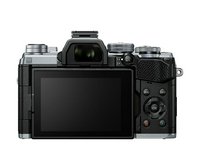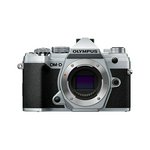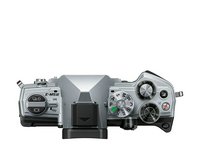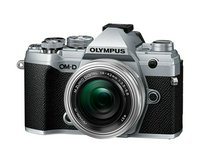Olympus OM-D E-M5 Mark III Mirrorless
MFT CameraProduct Gallery




Product Overview
Olympus OM-D E-M5 Mark III is a premium mirrorless camera in the Micro Four Thirds-mount system. Introduced by Olympus in 2019, it comes with a micro four thirds sensor with 20 MP (5184 x 3888) resolution and a 2.36 million-dot EVF.
The camera has a poor battery life, and a second or third battery may be needed to get you through the day. One should note that the OM-D E-M5 III has a 200 base ISO, which is not conducive to getting the cleanest images. Professionals and fanboys will be pleased by the extraordinary 30.0 fps burst rate that this camera can deliver.
The E-M5 Mark III comes with a fully articulated touch display and 121 autofocus points. Those who intend to use the E-M5 III for video work will be glad to find that the camera comes with 6.5 stops of IBIS.
Ratings
What we found
Neofiliac score 65%
Pros
- Fully articulated LCD
- 6.5 stops of IBIS
- Extraordinary 30.0 fps burst rate
- Rather compact
- Quite light
- Weather-sealed
- Viewfinder with great 1.37x magnification
- Supports both WiFi and Bluetooth
Cons
- Poor battery life
- 200 base ISO
- Low 20 MP resolution
- Low resolution EVF
What external reviewers found
External score 74%
Pros
- Great image quality, with superb dynamic range
- Good image quality
Cons
- Poor autofocus system
- Not compatible with UHS-II cards
- No vertical viewfinder
- No headphone jack
- No telephoto zoom
- No in-body stabilization
Your rating:
12345678910
?/10
Price Comparison
As associates of the merchants above, we earn a commission when you make a purchase using the supplied links.
Specifications
[{"Ft":"Connectivity","Fn":"Ports","Fv":"HDMI + Microphone + Remote Control + USB 2.0"},{"Ft":"Connectivity","Fn":"Wireless Connectivity","Fv":"802.11b/g/n + Bluetooth"},{"Ft":"Construction","Fn":"Form Factor","Fv":"Mirrorless camera"},{"Ft":"Construction","Fn":"Image Size","Fv":"Four Thirds (17.4 x 13 mm)"},{"Ft":"Construction","Fn":"Lens Mount","Fv":"Micro Four Thirds-mount"},{"Ft":"Construction","Fn":"Microphone","Fv":"Stereo"},{"Ft":"Construction","Fn":"Sensor | Resolution","Fv":"20 MP (5184 x 3888)"},{"Ft":"Construction","Fn":"Sensor | Type","Fv":"CMOS"},{"Ft":"Construction","Fn":"Speakers","Fv":"Mono"},{"Ft":"Dimensions","Fn":"Size | Depth","Fv":"50 mm / 1.97 in"},{"Ft":"Dimensions","Fn":"Size | Height","Fv":"85 mm / 3.35 in"},{"Ft":"Dimensions","Fn":"Size | Width","Fv":"125 mm / 4.92 in"},{"Ft":"Dimensions","Fn":"Weight","Fv":"414 g / 14.63 oz"},{"Ft":"Display","Fn":"Display Diagonal","Fv":"3 inch"},{"Ft":"Display","Fn":"Display Type","Fv":"Fully articulated TFT LCD"},{"Ft":"Display","Fn":"Resolution","Fv":"1,040,000 dots"},{"Ft":"Display","Fn":"Viewfinder | Coverage","Fv":"100%"},{"Ft":"Display","Fn":"Viewfinder | Magnification","Fv":"1.37x"},{"Ft":"Display","Fn":"Viewfinder | Resolution","Fv":"2,360,000 dots"},{"Ft":"Display","Fn":"Viewfinder | Type","Fv":"Electronic"},{"Ft":"Function","Fn":"AE Bracketing","Fv":"±5 (2, 3, 5 frames at 1/3 EV, 2/3 EV, 1 EV steps)"},{"Ft":"Function","Fn":"Autofocus","Fv":"121 focus points"},{"Ft":"Function","Fn":"Crop Factor","Fv":"2.0"},{"Ft":"Function","Fn":"Exposure Compensation","Fv":"±5 (at 1/3 EV, 1/2 EV, 1 EV steps)"},{"Ft":"Function","Fn":"Exposure Mode","Fv":"Auto / Aperture Priority / Shutter Priority / Manual"},{"Ft":"Function","Fn":"GPS","Fv":"No"},{"Ft":"Function","Fn":"ISO Range","Fv":"200 ~ 25600, expands to 64 ~ 25600"},{"Ft":"Function","Fn":"Image Stabilization","Fv":"5-axis, 6.5 stops"},{"Ft":"Function","Fn":"Intervalometer","Fv":"Yes"},{"Ft":"Function","Fn":"Processor","Fv":"TruePic VIII"},{"Ft":"Function","Fn":"Touch Screen","Fv":"Yes"},{"Ft":"Function","Fn":"Video Codecs","Fv":"MPEG-4, H.264"},{"Ft":"Function","Fn":"Weather Resistance","Fv":"Yes"},{"Ft":"Performance","Fn":"Battery Life","Fv":"310 shots"},{"Ft":"Performance","Fn":"Max Burst Rate","Fv":"30.0 fps"},{"Ft":"Performance","Fn":"Shutter Speed","Fv":"1/32000 s (electronic) / 1/8000 s (mechanical) ~ 60 s"},{"Ft":"Performance","Fn":"Storage","Fv":"SD/SDHC/SDXC (UHS-II supported)"},{"Ft":"Production","Fn":"Battery","Fv":"BLS-50 lithium-ion battery \u0026amp; charger"},{"Ft":"Production","Fn":"Debut","Fv":"2019-10-17"}]
External Reviews
digitaltrends[1]
Reviewer score 88% (normalized by Neofiliac)The E-M5 Mark III is a great first “real” camera for anyone looking to move up from a phone. From High Resolution Shot to Live Composite, there's so much you can do in-camera. The Mark III may be more functional than its predecessor, but it doesn't feel as premium, and that's a shame.
Pros
- Excellent image quality
- Excellent 5-axis stabilization
- Easy to use
Cons
- No vertical viewfinder
pcmag[2]
Reviewer score 51% (normalized by Neofiliac)The E-M5 Mark III doesn't do enough to move the needle to recommend it to photographers not already invested in the system. It's backed by a huge swath of Micro Four Thirds lenses, including some excellent zooms and small primes. The Sony a6400 and Fujifilm X-T30 cost less, though you will miss out on a stabilized sensor.
Pros
- Good image quality
- Dual-slot memory card
- Built-in EVF
Cons
- No in-body stabilization
- No telephoto zoom
rtings[3]
Reviewer score 62% (normalized by Neofiliac)The Olympus OM-D E-M5 Mark III is good for travel photography. It's small and lightweight, making it easy to take with you wherever you go. It also has excellent image quality, with photos that look sharp and relatively noise-free even at higher ISO levels. But its small size can make it uncomfortable to hold for those with larger hands.
Pros
- Excellent image quality
- Very good shooting speed
- Image quality remains sharp and relatively noise-free at higher ISO levels
- Well-built, lightweight design
- Great image quality, with superb dynamic range
- Good image quality
Cons
- Poor autofocus system
- Small size can make it uncomfortable to hold for larger hands
- No headphone jack
techradar[4]
Reviewer score 89% (normalized by Neofiliac)The Olympus OM-D E-M5 Mark III looks like a purist's camera, but under the hood it's a serious machine. The big changes are the new sensor with higher resolution, on-chip phase detection autofocus, and improved video performance. We have few complaints when it comes to color rendition for both stills and video. The Flat color profile for video shooting is lovely, and we didn't miss having a V-Log color profile option.
Pros
- Fantastic image quality
- Compact and lightweight
- Great selection of lenses
Cons
- Small sensor
trustedreviews[5]
Reviewer score 82% (normalized by Neofiliac)Olympus has packed some of its best technology into a small and light model. The E-M5 Mark III delivers well-saturated, punchy images with plenty of detail. It suffers in extreme low-light situations as a result of the smaller sensor. The inclusion of only a single card slot is disappointing, but it is at least compatible with the faster UHS-II format cards.
Pros
- Super-fast autofocus
- Excellent image stabilisation system
- Good battery life
Cons
- Small sensor
- Not compatible with UHS-II cards
Also Check
References
<
>
x